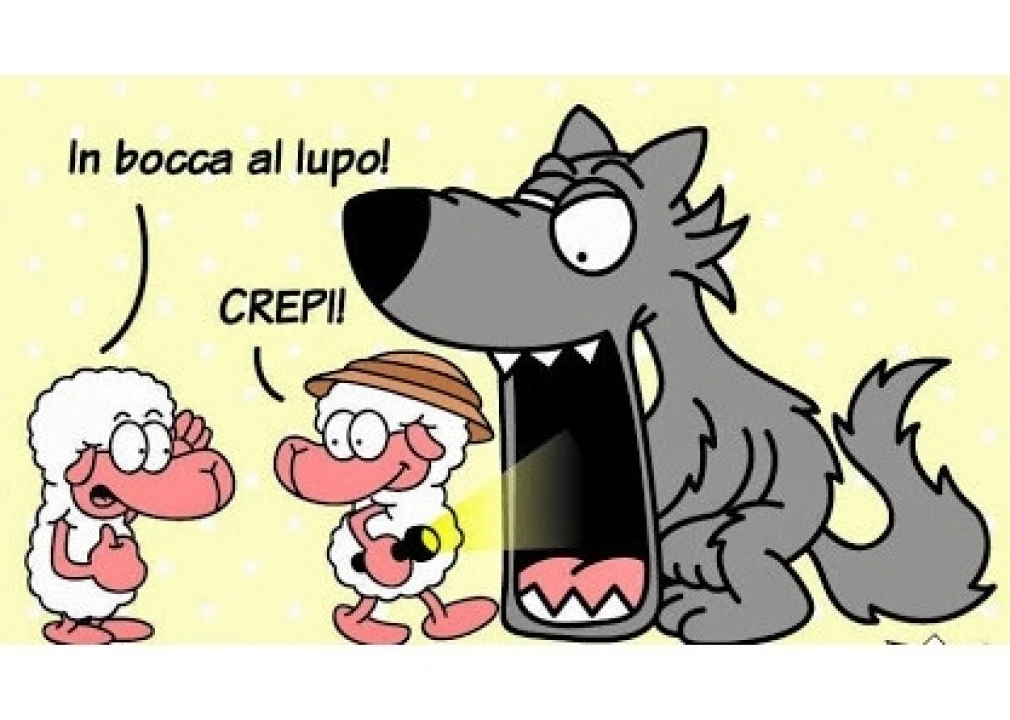WTI Magazine #78 2016 April 15
Author : Giosuè Prezioso Translation by:
A friend of yours is going to hold an important seminar. You: "break your leg!"; a group of actors, stressed out, is going to start its play in less than a couple of minutes. You: "break your leg!". Before a given important appointment, event, or occasion, we usually wish what in fact we would never hope to happen: "to break a leg". In English, as well as in Italian – but also in German, Polish, French - and many other languages, many common expressions wishing good luck actually have an opposite meaning.
But why is such an affectionate wish actually expressed through negative expressions? In order to explain this phenomenon, let's see how the English "break your leg", and the Italian "In bocca al lupo" (literally: [hope you go/end] in the mouth of the wolf) firstly originated.
According to the Accademia della Crusca – the highest institute of Italian Studies – "in bocca al lupo" was an expression commonly used by hunters. Before starting the hunting season, "in bocca al lupo" became a warm greeting wishing safety and protection, as the direct response to it fairly was: "Crepi!", meaning "may [the wolf] die!". Therefore, this expression was meant to protect the hunter during hunting, but also to wish an abundant loot: "the wolf dies, and I, the hunter, go back home safe, with a lot of meat!".
However, the imagine of the wolf as a scary dangerous animal draws from a more extensive tradition. Back in the Middle Ages, most of the towns, villages, and counties were located in the middle of woods, where wolves and wild animals usually scared the whole population. There are stories in which wolves torture, kill, and even rape animals and human beings; there are some others, in which wolves become men, women, and even children: the wolf becomes, de facto, the icon of fear.
The first official literary reference mentioning the "mouth of the wolf" as frightening is a piece by Guittone d' Arezzo (1294), saying: "Ma la povera femmina, accostandosi a quell'huomo, si accorse d'essere andáta in bocca al lupo" (getting close to that man, the poor woman realized she [suddenly] was in the wolf's mouth). The "wolf's mouth" metaphorically signifies the enemy, the bad luck, and the evil eye, assuming, also, some nuanced erotic connotations, which can be found also in other languages. Se précipiter dans la gueule du loup, which in French means "to fall in the wolf's mouth"; ein Wolf im Schafspelz, meaning "wolf in lamb's look" in German, but also the Polish ezxpression nie wywołuj wilka z lasu, meaning "do not call the wolf from the forest", ergo: "do not call/desire the bad luck!".
The wishes having the wolf as a bad, frightening character are many. However, by hoping it "Crepi", it dies, we visually defeat it, fighting against a secular tradition reiterated from the Middle Ages.
The English expression "break your leg", usually used in contexts such as theatre, rehearsals, and more generally big occasions is, as in the case of "in bocca al lupo", a wish having a literal negative connotation: "break-your-leg!" (auch!). The origin of such saying is a bit nebulous. Some official data state that the first person to use it was Robert Wilson Lynd, a journalist of the New Statesman. In an edition of 1921, Lynd is writing about horse racing, stating: "[when you wish good luck] you should say something insulting, such as, 'May you break your leg!". This idea comes from the common assumption that positive expressions, such as "good luck", "have a great...!", or "hope you...!" may invoke negative spirits.
Another interesting explanation may come from the German expression Hans und beinbruch. Used in aviation contexts, and meaning "happy landings!" this saying is both popular in English and German. However, its literal translation is: "break [all your] bones/leg", a warm sentiment of luck that, from the world of war and aviation, has presumably reached colloquial language and then theatre.
It seems finally from theatre that, the expression "break your leg", may have drowned. At the end of any play and performance, in Shakespeare's time any actor had to bow and bend at the knee. The stronger was the applause, the more emphatic was the bowing; hence, "to break your leg" wished the actor(s) to have a good performance and receive a big applause, bowing and bowing with emphasis, up until the leg did not break.
Regardless their origins, "in bocca al lupo" and "break your leg" have in common the negative, controversial aim to wish good luck. As Lynd suggests, in fact, by wishing "good luck", people think they invoke evil spirits, obtaining, by contrast, bad luck and misfortune.
After all, in the Roman world, "Fortuna", the goddess of Luck, was represented with a bandage around the eyes, as she, a bit capricious, usually acted with vagueness, ambiguity, and surprise. Luck is, in fact, "blind", as blind are her origins, her meanings, and her secrets: all unknown: in bocca al lupo!




